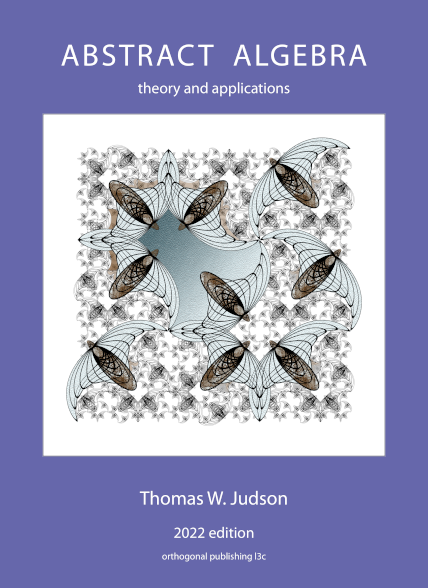Exercises 22.4 Exercises
1.
Calculate each of the following.
\(\displaystyle [\gf(3^6) : \gf(3^3)]\)
\(\displaystyle [\gf(128): \gf(16)]\)
\(\displaystyle [\gf(625) : \gf(25) ]\)
\(\displaystyle [\gf(p^{12}): \gf(p^2)]\)
2.
Calculate \([\gf(p^m): \gf(p^n)]\text{,}\) where \(n \mid m\text{.}\)
3.
What is the lattice of subfields for \(\gf(p^{30})\text{?}\)
4.
Let \(\alpha\) be a zero of \(x^3 + x^2 + 1\) over \({\mathbb Z}_2\text{.}\) Construct a finite field of order \(8\text{.}\) Show that \(x^3 + x^2 + 1\) splits in \({\mathbb Z}_2(\alpha)\text{.}\)
5.
Construct a finite field of order \(27\text{.}\)
6.
Prove or disprove: \({\mathbb Q}^\ast\) is cyclic.
7.
Factor each of the following polynomials in \({\mathbb Z}_2[x]\text{.}\)
\(\displaystyle x^5- 1\)
\(\displaystyle x^6 + x^5 + x^4 + x^3 + x^2 + x + 1\)
\(\displaystyle x^9 - 1\)
\(\displaystyle x^4 +x^3 + x^2 + x + 1\)
8.
Prove or disprove: \({\mathbb Z}_2[x] / \langle x^3 + x + 1 \rangle \cong {\mathbb Z}_2[x] / \langle x^3 + x^2 + 1 \rangle\text{.}\)
9.
Determine the number of cyclic codes of length \(n\) for \(n = 6, 7, 8, 10\text{.}\)
10.
Prove that the ideal \(\langle t + 1 \rangle\) in \(R_n\) is the code in \({\mathbb Z}_2^n\) consisting of all words of even parity.
11.
Construct all BCH codes of
length \(7\text{.}\)
length \(15\text{.}\)
12.
Prove or disprove: There exists a finite field that is algebraically closed.
13.
Let \(p\) be prime. Prove that the field of rational functions \({\mathbb Z}_p(x)\) is an infinite field of characteristic \(p\text{.}\)
14.
Let \(D\) be an integral domain of characteristic \(p\text{.}\) Prove that \((a - b)^{p^n} = a^{p^n} - b^{p^n}\) for all \(a, b \in D\text{.}\)
15.
Show that every element in a finite field can be written as the sum of two squares.
16.
Let \(E\) and \(F\) be subfields of a finite field \(K\text{.}\) If \(E\) is isomorphic to \(F\text{,}\) show that \(E = F\text{.}\)
17.
Let \(F \subset E \subset K\) be fields. If \(K\) is a separable extension of \(F\text{,}\) show that \(K\) is also separable extension of \(E\text{.}\)
18.
Let \(E\) be an extension of a finite field \(F\text{,}\) where \(F\) has \(q\) elements. Let \(\alpha \in E\) be algebraic over \(F\) of degree \(n\text{.}\) Prove that \(F( \alpha )\) has \(q^n\) elements.
19.
Show that every finite extension of a finite field \(F\) is simple; that is, if \(E\) is a finite extension of a finite field \(F\text{,}\) prove that there exists an \(\alpha \in E\) such that \(E = F( \alpha )\text{.}\)
20.
Show that for every \(n\) there exists an irreducible polynomial of degree \(n\) in \({\mathbb Z}_p[x]\text{.}\)
21.
Prove that the Frobenius map \(\Phi : \gf(p^n) \rightarrow \gf(p^n)\) given by \(\Phi : \alpha \mapsto \alpha^p\) is an automorphism of order \(n\text{.}\)
22.
Show that every element in \(\gf(p^n)\) can be written in the form \(a^p\) for some unique \(a \in \gf(p^n)\text{.}\)
23.
Let \(E\) and \(F\) be subfields of \(\gf(p^n)\text{.}\) If \(|E| = p^r\) and \(|F| = p^s\text{,}\) what is the order of \(E \cap F\text{?}\)
24. Wilson's Theorem.
Let \(p\) be prime. Prove that \((p-1)! \equiv -1 \pmod{p}\text{.}\)
25.
If \(g(t)\) is the minimal generator polynomial for a cyclic code \(C\) in \(R_n\text{,}\) prove that the constant term of \(g(x)\) is \(1\text{.}\)
26.
Often it is conceivable that a burst of errors might occur during transmission, as in the case of a power surge. Such a momentary burst of interference might alter several consecutive bits in a codeword. Cyclic codes permit the detection of such error bursts. Let \(C\) be an \((n,k)\)-cyclic code. Prove that any error burst up to \(n-k\) digits can be detected.
27.
Prove that the rings \(R_n\) and \({\mathbb Z}_2^n\) are isomorphic as vector spaces.
28.
Let \(C\) be a code in \(R_n\) that is generated by \(g(t)\text{.}\) If \(\langle f(t) \rangle\) is another code in \(R_n\text{,}\) show that \(\langle g(t) \rangle \subset \langle f(t) \rangle\) if and only if \(f(x)\) divides \(g(x)\) in \({\mathbb Z}_2[x]\text{.}\)
29.
Let \(C = \langle g(t) \rangle\) be a cyclic code in \(R_n\) and suppose that \(x^n - 1 = g(x) h(x)\text{,}\) where \(g(x) = g_0 + g_1 x + \cdots + g_{n - k} x^{n - k}\) and \(h(x) = h_0 + h_1 x + \cdots + h_k x^k\text{.}\) Define \(G\) to be the \(n \times k\) matrix
and \(H\) to be the \((n-k) \times n\) matrix
Prove that \(G\) is a generator matrix for \(C\text{.}\)
Prove that \(H\) is a parity-check matrix for \(C\text{.}\)
Show that \(HG = 0\text{.}\)
